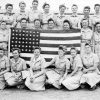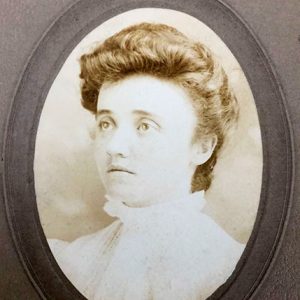calsfoundation@cals.org
Ida Hayman Callery (1886–1917)
Ida Hayman Callery was a teacher, suffragist, feminist, and socialist organizer in Arkansas prior to World War I. She traveled extensively as an organizer for the Socialist Party in Arkansas, Oklahoma, and Kansas. Her unwillingness to acknowledge the equality of African Americans, however, served to limit her influence, as she consciously excluded them from her efforts.
Ida Hayman was born on October 23, 1886, on a farm near Caldwell in Sumner County, Kansas, the eldest of eight children of William D. Hayman, who was a farmer and businessman, and Emma Belle Burnett Hayman, a homemaker. Hayman worked on the family farm and later worked on behalf of tenant farmers and coal miners. After her father lost money in the declining cotton market, Hayman’s family moved south across the border into Indian Territory (present-day Oklahoma) by 1890 to join the Socialist Party. She attended and graduated from high school in Harrison (Boone County) in Arkansas.
Working alongside her father as he recruited Socialist Party members throughout the state, Hayman sharpened her recruiting and organizing skills as she organized the local offices that were essential to this grassroots organization. After she earned her teaching certificate, Hayman taught in the federal government’s schools for Native Americans. In 1908, at age twenty-two, she was elected state secretary of the Oklahoma Socialist Party.
In 1909, Hayman married Philip Callery, a prominent Kansas socialist. She resigned her Oklahoma post before giving birth to her only child, Anabel, in January 1910. Throughout the next decade, Ida Callery continued to work for the socialist movement and resumed her teaching career. In 1911, she accepted a teaching position in Arkansas coal country, in Bonanza (Sebastian County), and soon began reading the law under Arkansas socialist Dan Hogan in his Huntington (Sebastian County) office. Soon afterward, Callery was appointed as the state secretary for the Socialist Party of Arkansas, a faction-ridden organization in need of her more fiscally responsible style of leadership.
As Callery continued her grassroots work alongside Dan Hogan’s daughter Freda Hogan, she coordinated a two-day engagement that was attended by as many as 1,500. Similar but smaller encampment meetings throughout the state soon followed as a way to educate locals as well as provide recreational opportunities. These camp meetings reinforced the collective spirit built on similar political and economic interests among local members in their own class struggles that socialism promised to improve.
In less than a year, Callery was instrumental in increasing the number of Socialist Party members in the state from 400 to 2,376. Callery traveled throughout Arkansas to inspire workers to organize at the grassroots level, a founding principle of socialism. Most importantly, many of the leaders in the socialist movement were also officers in the more formally organized United Mine Workers of America (UMW). Because the unions had been more successful in limiting the power that the mining companies had over the lives of the miners in Arkansas, they represented a more fully developed example of the socialist ideal of workers’ controlling more of their own economic lives. As a result, Hayman concentrated her Socialist Party efforts in UMW strongholds such as Bonanza, Jenny Lind (Sebastian County), Hartford (Sebastian County), and Huntington, where she was based.
Callery was reelected as state secretary in 1912, and she also served as a delegate to the National Socialist Party convention. Under her leadership, the Socialist Party in Arkansas reached its zenith in 1914 when it claimed more than 2,000 members who were affiliated with about 200 locals around the state.
In 1914, Callery resigned her leadership positions and moved to join her husband in Kansas. There, she continued her legal studies in support of workers’ rights and became a member of the Kansas State Bar. She and her husband then set up a law office in Pittsburg, Kansas, where they officially represented UMW District 14.
Suffering from peritonitis, Callery died on April 14, 1917, a few months before her thirtieth birthday; she is buried in Mount Olive Cemetery in Pittsburg.
For additional information:
Green, James R. Grass-Roots Socialism: Radical Movements in the Southwest, 1895–1943. Baton Rouge: Louisiana State University Press, 1978.
Philip Callery and Ida Hayman Callery Collection. Special Collections Department. Leonard H. Axe Library. Pittsburg State University, Pittsburg, Kansas. Finding aid online at http://digitalcommons.pittstate.edu/fa/23/ (accessed September 15, 2017).
Pierce, Michael. “Great Women All, Serving a Glorious Cause: Freda Hogan Ameringer’s Reminiscences of Socialism in Arkansas.” Arkansas Historical Quarterly 69 (Winter 2010): 293–324.
Kelly A. Woestman
Pittsburg (KS) State University
 Civil Rights and Social Change
Civil Rights and Social Change Early Twentieth Century, 1901 through 1940
Early Twentieth Century, 1901 through 1940 Politics and Government
Politics and Government Women
Women Ida Callery
Ida Callery 



Comments
No comments on this entry yet.